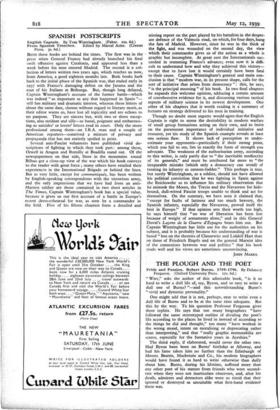SPANISH POSTSCRIPTS
English Captain. By Tom Wintringham. (Faber. us. 6d.) From Spanish Trenches. Edited by Marcel Acier. (Cresset Press. 3s. 6d.) Boni these books are behind the times. The first was in the press when General Franco had already launched his final swift offensive against Catalonia, and appeared less than a week before his men entered Madrid. The second is a col- lection of letters written two years ago, which reaches us now, from America, a good eighteen months late. Both books hark back to the initial phase of the Spanish war, that ended early in 8937 with Franco's damaging defeat on the Jarama and the rout of his Italians at Brihuega. But, though long delayed, Captain Wintringham's account of the former battle—which was indeed " as important as any that happened in Spain"— still has military and dramatic interest, whereas these letters of about the same date, chosen without regard to literary merit, as their editor warns us, have lost all topicality and are echoes to no purpose. They are sincere but, with two or three excep- tions, also strident and silly—as banal, poignant and embarrass- ing as suicides' or lovers' letters read in court. Only the more professional among them—an I.R.A. man and a couple of American reporters—contrived a mixture of privacy and propaganda that has not entirely spoiled in print.
Several anti-Fascist volunteers have published vivid de- scriptions of fighting in which they took part : among these, Orwell in Aragon and Romilly at Boadilla stand out. Of the newspapermen on that side, Steer in the mountains round Bilbao got a close-up view of the war which his book conveys to the reader with great force ; many others have retailed their experiences in the International Brigade or behind the lines.
But as very little, except for communiqués, has been written by English-speaking correspondents with the victorious army,
and the only impressions that we have had from an anti-
Marxist soldier are those contained in two short articles in The Times, Captain Wintringham's book has a special value,
because it gives us our first account of a battle in Europe's recent dress-rehearsal for war, as seen by a commander in the field. Five of his fifteen chapters form a detailed and stirring report on the part played by his battalion in the desper- ate defence of the Valencia road, on which, for four days, hung the fate of Madrid. However, since he was in the thick of the fight, and was wounded on the second day, the view which their commander gives us of the action as a whole is graphic but incomplete. At great cost the Internationals suc- ceeded in stemming Franco's advance; even now it is diffi- cult to understand how and why they achieved this victory— except that to have lost it would certainly have been fatal to their cause. Captain Wintringham's general and main con- clusion is that " modern war, in its present shape, calls for the sort of initiative that arises from democracy ": this, he says, " is the principal meaning " of his book. In two final chapters he expands this welcome opinion, adducing a certain amount of corroborative evidence for it, and discussing various tactical aspects of military science in its newest development. One other of his chapters that is worth reading is a summary of lectures on strategy delivered to his men in training.
Though no doubt most experts would agree that the English Captain is right to stress the desirability in modern warfare of small group formations acting on their own, and to insist on the paramount importance of individual initiative and resource, yet his study of the Spanish example reveals at least one serious flaw. It shows lack of perception to under- estimate your opponents—particularly if their strong point, which you fail to see, lies in exactly the form of strength you advocate. The weakness of the authoritarian army, according to this writer, is only partly due to " the inevitable mediocrity of its generals," and must be attributed far more to " the irreparable mistake (which only a democracy can avoid) of treating its infantry as cannon-fodder." This perhaps is true, but surely Wintringham, as a soldier, should not have allowed his political conviction that he was fighting in Spain against the Reichswehr so to influence his military observation that he mistook the Moors, the Tercio and the Navarrese for hide- bound, dull-witted Fascist troops unable to think and act for themselves. On the contrary, we have seen it claimed that, " except for faults of laziness and too much bravery, the Spanish infantry, especially the Navarrese, proved itself the best in Europe." If that opinion sets their worth too high, he says himself that "no war of liberation has been lost because of weight of armaments alone," and in this General
Duval's Lecons de la Guerre d'Espagne bears him out. But Captain Wintringham has little use for the authorities on his
subject, and it is probably because his understanding of war is based " less on the theories of Clausewitz and Liddell Hart than on those of Friedrich Engels and on the general Marxist idea of the connexions between war and politics " that his book reads well and his views are sometimes unconvincing.
JOHN MARKS.


















































 Previous page
Previous page